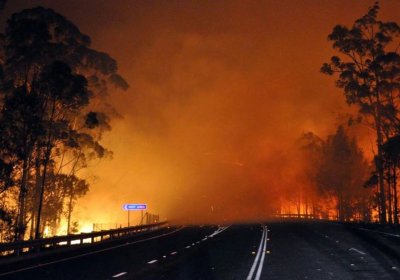As this century progresses, the record high temperatures experienced across Australia in the past few months will no longer be dangerous departures from the norm, but a regular feature of Australian summers. This is one of the conclusions reached in a draft of the fifth assessment report of the United Nations Intergovernmental Panel on Climate Change (IPCC), which was leaked and published online last month.
Climate change
A “dome of heat” has settled over Australia, causing a heatwave in every state and territory and widespread bushfires. Tasmania has been the worst hit with 150 homes damaged or destroyed.
"The situation is pretty grim," Reihana Mohideen told Green Left Weekly on August 8 from the frontline of devastating floods that have submerged half of Manila over the last few days. "It's still raining hard and hard to get around."
"This is another painful reminder of the global climate change crisis and the pain is being felt most by the poor and most oppressed."
Right now, there is an opportunity to slash Australia’s carbon emissions by 5 million tonnes a year in one stroke. The city of Port Augusta in South Australia has all the right conditions to make it Australia’s first baseload renewable energy hub.
The two coal-fired power stations at Port Augusta are getting old. Industry experts say they may be forced to close as soon as 2015.
It can sometimes feel like we’re losing a race against time to avoid environmental catastrophe and social collapse.
Climate change is already extinguishing species, destroying essential food production and forcing thousands of people to flee their island homes.
People are directly affected by more wars than ever before in history.
While the underlying causes of the recent global financial crisis remain, governments are imposing vicious austerity policies on the majority of people in the Global North and South to pay for the capitalists’ greed.
The casual observer might easily conclude that there are just two clear sides in the parliamentary debate over the Labor/Greens carbon price deal.
But there is a lot more to the debate than this.
Clearly the Greens are in favour, and appear to have won over PM Julia Gillard’s government to an interim carbon tax.
On the other hand, opposition leader Tony Abbott has promised a Tea Party-style uprising against it. Abbott will push to rouse a fascistic “people’s” movement to try to bury the deal.
The United Nations global climate summit in Cancun, Mexico, looks set to repeat the failures of Copenhagen. The chances of Cancun producing a binding agreement that would avert climate disaster are next to zero.
Many world leaders have not even bothered to attend the summit, which runs from November 29 to December 10.
Leaders of rich nations and the media talked much about the “low expectations” of an agreement in the lead-up to the conference.
As indigenous peoples, we are extremely concerned that the principles agreed upon in the Cochabamba People’s Agreement have been unilaterally removed from the negotiating document [for the Cancun climate conference] that was released on November 24.
Equally alarming is the misrepresentation of the Copenhagen Accord as a legitimate path forward, despite its widespread denouncement by civil society and its tepid reception last December in Denmark, when the United Nations merely “took note of” it.
If at first you don’t succeed, redefine success. This phrase has become the unofficial motto of this year’s United Nations climate conference in Cancun, Mexico.
A week out from Cancun, which runs over November 29 to December 10, there is little hope of meaningful progress. Yet key players have sought to throw a shroud of official optimism over the looming failure.
Few Western politicians want a repeat of last year’s Copenhagen climate conference. They consider it a public relations disaster.
Woodside and the Western Australian government’s push to build a massive gas-processing plant at James Price Point will be a key battle in a broader campaign to protect the cultural and environmental heritage of the Kimberley region in WA.
This battle is significant for several reasons.
First, the government is trying to compulsorily acquire Aboriginal land. Traditional owners, some of who had previously been prepared to support the project, are now united in opposition. Many unions, including the Australian Manufacturing Workers Union, are supporting them.
Natural gas is a finite resource. Once it is depleted, it cannot be renewed. It is extracted from coal beds and consists primarily of methane. Methane is 72 times worse than carbon dioxide — the most well-known carbon pollutant — as a greenhouse gas.
The City of Sydney plans to use natural gas as the primary fuel to transition away from coal-fired electricity towards low-carbon energy by using a method of energy production known as trigeneration.
The big “greenwash” of gas as the new “green energy” isn’t going down well in inner-city Sydney.
On November 14, the Sydney Morning Herald revealed gas exploration would start within two months in the inner-city suburb of St Peters.
The article said said Macquarie Energy, which is owned by Apollo Gas, received state government permission for exploration in March. The community had been kept in the dark; even the Marrickville Council, which partly covers the area, knew nothing.
- Previous page
- Page 9
- Next page











